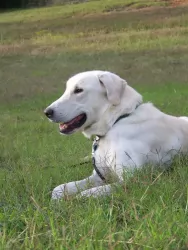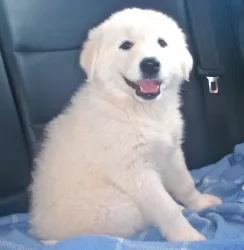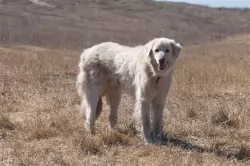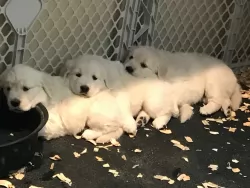 MyDogBreeds
MyDogBreedsBull and Terrier is originated from United Kingdom but Akbash Dog is originated from Turkey. Bull and Terrier may grow 34 cm / 13 inches shorter than Akbash Dog. Bull and Terrier may weigh 43 kg / 94 pounds lesser than Akbash Dog. Bull and Terrier may live 3 years more than Akbash Dog. Both Bull and Terrier and Akbash Dog has same litter size. Bull and Terrier requires Low maintenance. But Akbash Dog requires Moderate maintenance
The Bull and Terrier is a blend between a number of Old English Terriers and the Old English Bulldog. It is believed that this extinct dog was the start of breeds such as the American Pit Bull Terrier and the Staffordshire Bull Terrier.
They were excellent for hunting rats and weren’t a true breed. The dog was popular in the British Isles and in the United States in the 19th Century. They became rare as different varieties of Bull and Terrier were bred and standardized.
Most terriers have a good deal of Old English Bulldog blood in them so as to provide them with the courage to fight and hunt prey, while the English Terrier blood provided a feisty temperament and longer legs for speed.
Around 1860, the Bull and Terrier breed split into 2 categories – the pure white Bull Terrier and the ones of color. The Bull and Terrier was never recognized as a standardized breed by any of the kennel clubs.
 Akbash breed became popular in the 1970s. Around that period, Akbash was introduced to North America. There is archeological evidence that this breed was popular even in the 750-300 BC. Of course, it wasn’t the exact dog as we know it today, but there are many similarities between Akbash and dog from the ancient period. This breed was developed in Turkey to be a guardian dog. They were perfect flock guardians.
Akbash breed became popular in the 1970s. Around that period, Akbash was introduced to North America. There is archeological evidence that this breed was popular even in the 750-300 BC. Of course, it wasn’t the exact dog as we know it today, but there are many similarities between Akbash and dog from the ancient period. This breed was developed in Turkey to be a guardian dog. They were perfect flock guardians.
There isn’t too much detail and information on the Bull and Terrier but we can be sure that with the cross between the Old English Bulldog and the Old English Terrier, he would have been a small to medium sized compact, muscular dog, standing roughly between 38cm to 50cm in height and weighing anything in the region of 11 to 22kg.
He would have had a big head, and most of the dogs had a medium to long tail. His coat was of many colors such as white, fawn, tan or brindle and would have been short and smooth.
As far as temperament goes, the Bull and Terrier would certainly be courageous, feisty, independent, strong and energetic. Socialization wasn’t available in those days but with training, this intelligent breed would be affectionate with his human family.
 Weight of the Akbash dog variates from 41-64kg, while their height is 71-78cm. Female Akbash is smaller than a male Akbash, but not for much.
A lifespan of an average Akbash dog is 10-11 years, but if they have cared properly, they tend to live longer.
Litter Size of Akbash is 8-9 puppies.
Another Name for Akbash is Akbas Coban Kopegi, Coban Kopegi.
Weight of the Akbash dog variates from 41-64kg, while their height is 71-78cm. Female Akbash is smaller than a male Akbash, but not for much.
A lifespan of an average Akbash dog is 10-11 years, but if they have cared properly, they tend to live longer.
Litter Size of Akbash is 8-9 puppies.
Another Name for Akbash is Akbas Coban Kopegi, Coban Kopegi.
Nobody seems to be 100% sure when the classic Bull and Terrier dog became extinct but it is strongly assumed that it was some time between 1890 and 1920.
People believe that there are actually surviving breeds that could be considered Bull and Terriers. One thing is sure, when you consider that the Bull and Terrier is actually made up of several breeds such as the Bull Terrier, the Staffordshire Bull Terrier, Boston Terrier and American Pit Bull Terrier then you can imagine the character of the dog – brave, hardy, intelligent, feisty, bold, confident and fearless. He was a dog who loved his human family and would have been both friend and protector.
These dogs have been popular around the world, and have had a strong influence in the development of a number of other breeds. Even today, breeders are always looking at ways to develop new breeds based on the descendants of the Bull and Terrier.
 Have in mind that Akbash is a large and powerful dog. They are bred through generations to be guardians and suspicious. They are very independent because they tend to make their own decisions while guarding flocks. They will require adequate socialization, but overall, they are very intelligent and they tend to learn quickly. It requires time and patience, but are great pets for right owners. Akbash has a white to biscuit color coat. They also have a dark pigment around nose, eyes, and mouth. Akbash is very quick and agile dog, which might be surprised because of its size.
Have in mind that Akbash is a large and powerful dog. They are bred through generations to be guardians and suspicious. They are very independent because they tend to make their own decisions while guarding flocks. They will require adequate socialization, but overall, they are very intelligent and they tend to learn quickly. It requires time and patience, but are great pets for right owners. Akbash has a white to biscuit color coat. They also have a dark pigment around nose, eyes, and mouth. Akbash is very quick and agile dog, which might be surprised because of its size.
It is important to train them since the puppyhood. They are working dogs and they will be happy when they have tasks during training. Due to their independence, consistent and steady training is important. An old-fashioned way of training that includes punishment is not recommendable. Positive training with awards is the best way to train your Akbash dog. They do not require a lot of daily exercises. Daily walks would do more than enough. Younger dogs need more exercise than more mature ones. They can be very good for other animals, but they have to be socialized with them. It is the best way to socialize your dog when it is still a puppy.
The Bull and Terrier was no doubt a robust breed with few health issues. However his owners of that time would have had to be aware of eye diseases such as cataracts that could have lead to blindness.
Other health issues they would have had to contend with would have been hip and elbow dysplasia, a disease which can cause lameness in a dog accompanied with pain. Because the Bull and terrier was mixed with the English Bulldog, the dog owners would have had to be aware of respiratory health problems, as the Bull dog is a breed that is susceptible to these problems.
 Generally, Akbash is a very healthy breed. They do not have any major health issues. As many large breeds, they can develop hip dysplasia and OCD. But with proper care, regular vet checks, and choosing the right puppy, you won’t be having any problems.
Generally, Akbash is a very healthy breed. They do not have any major health issues. As many large breeds, they can develop hip dysplasia and OCD. But with proper care, regular vet checks, and choosing the right puppy, you won’t be having any problems.
Long ago the Bull and Terrier was developed to be a hunting dog, and because he was a blend of the English Bulldog and Terriers such as the Staffordshire Bull Terrier and English Terrier, he no doubt had a short coat that would have required being brushed down from time to time.
The Bull and Terrier dog was bred for hunting, and he would have in all likelihood have caught some of his own food. He would therefore have got a lot of protein in. His owners would also have fed him some of their own food too which would have been eggs, home-made bread, rice, fresh vegetables and meat.
He would have had a good quota of raw meat in his diet too and this would have ensured that his coat was shiny and glossy, free of rashes. Dogs such as the Bull and Terrier wouldn’t have eaten commercially produced kibble as that was only introduced in the 1930s.
 Akbash dog is very easy to care. They can stay fit on a minimum amount of food. 2-2.5 cups divided into two meals would be ideal for your dog. They require meat, so giving them dry industrial food can be a solid substitute. Vegetables and oil can also be included in meals. It will keep your dog healthy and happy.
Akbash dog is very easy to care. They can stay fit on a minimum amount of food. 2-2.5 cups divided into two meals would be ideal for your dog. They require meat, so giving them dry industrial food can be a solid substitute. Vegetables and oil can also be included in meals. It will keep your dog healthy and happy.
Puppies have to eat more meals per day. It is the best to give your puppy Akbash 3-5 meals per day. Those meals should be divided into smaller portions. It is recommended to give your puppy all necessary vitamins and minerals that include calcium for stronger bones. It will improve the overall health of your dog, and it will help it develop into a healthy adult dog.
Akbash will request some grooming, but they are not very difficult to groom. They require regular grooming. Every few days will be enough, except when they are shedding. Akbash will need daily grooming when shed. You can bath your pet occasionally, but not very often. Bathing, if necessary, should be done only 5-6 times a year. There is no need for more.